VENDETTA by Michael Dibdin Wednesday, 01.50 -- 02.45 Aurelio Zen lounged on the sofa like alistless god, bring- ing the dead back to life. With a flick ofhis finger he made them rise again. One by one the shapeless,blood- drenched bundles stirred, shook themselves,crawled about a bit, then floated upwards untilthey were on their feet again. This extremely literalresurrection had taken them by surprise, to judge by theirexpressions, or per- haps it was the sight of each others'bodies that was so shocking, the hideous injuries anddisfigurements, the pools and spatters of blood everywhere. Butas Zen con- tinued to apply his miraculousintervention, all this was set to rights too: the gaping rents inflesh and fabric healed themselves, the blood mopped itself up, andin no time at all the scene looked almost like theordinary dinner party it had been until the impossible occurred.None of the four seemed to notice the one remarkable featureof this spuri- ous afterlife, namely that everythinghappened backwards. 'What's wrong, mamma?' She pointed at the television, which nowshowed a beach of brilliant white sand framed bysmoothly curved rocks. 'What's wrong, mamma?' She pointed at the television, which nowshowed a beach of brilliant white sand framed bysmoothly curved rocks.
A man was swimming backwards throughthe wavelets. He casually dived up out of thewater, landed neatly on one of the rocks and strolledbackwards to the shaded lounging chairs where the others satsucking smoke out of the air and blowing it intocigarettes. 'The one in the swimming costume. He didit. He was in love with his wife so he killed him. He wasin another one too, last week, on Channel Five.
Theythought he was a spy but it was his twin brother. He wasboth of them. They do it with mirrors.' Mother and son gazed at each other acrossthe room lit by the electronically preserved sunlight ofa summer now more than three months in the past. It wasalmost two o'clock in the moming, and even the streetsof Rome were hushed. Zen pressed the pause button of the remotecontrol unit, stilling the video. 'Why are you up, mamma?' he asked, tryingto keep his irritation out of his voice.
This wasbreaking the rules. Once she had retired to her room, hismother never re- appeared. It was respect for theseunwritten laws that made their life together just abouttolerable from his point of view. 'I thought I heard something.' Their eyes still held. The woman who hadgiven Zen life might have been the child he had never had,awakened by a nightmare and seeking comfort. 'I'm sorry, mamma. 'I'm sorry, mamma.
I turned the sound rightdown...' 'I don't mean the TV.' He interrogated those bleary, evasive eyesmore closely. 'What, then?' She shrugged pettishly. 'A sort of scraping.' 'Scraping? What do you mean?' 'Like old Umberto's boat.' Zen was often brought up short by hismother's refer- ences to a past which for her wasinfinitely more real than the present would ever be. He had quiteforgotten Umberto, the portly, dignified proprietorof a general grocery near the San Geremia bridge. Heused the boat to transport fruit and vegetables from theRialto market, as well as boxes, cases, bottles and jars toand from the cellars of his house, which the ten-year-old Zenhad visualized as an Aladdin's cave crammed with exoticdelights. When not in use, the boat was moored to a postin the little canal opposite the Zens' house.
The post had atin collar to protect the wood, and a few moments aftereach vaporetto passed down the Cannaregio the wash wouldreach Umberto's boat and set it rubbing itsgunwale against the collar, producing a series of metallicrasps. 'It was probably me moving around in herethat you heard,' Zen told her. 'Now go back to bed,before you catch cold.' 'It didn't come from in here. It came fromthe other side. Across the canal. Just like that damnedboat.' Zen took her by the arm, which feltalarmingly fragile.
Widowed by the war, his mother hadconfronted the world alone on his behalf, wrestingconcessions from tradesmen and bureaucrats, labouring atmenial jobs to eke out her pension, cooking, cleaning,sewing, mending and making do, tirelessly and ingeniouslyhollowing out and shoring up a space for her son to growup in. Small wonder, he thought, that the effort hadreduced her to this pittance of a person, scared of noises andthe dark, with no interest in anything but the televisionserials she watched, whose plots and characters were graduallybecoming con- fused in her mind. Such motherhood as shehad known was like those industrial jobs that leaveworkers crippled and broken, the only difference being thatthere was no one mothers could sue for damages. Zen led her back into the musty bedroom sheoccupied at the back of the apartment, filled withthe furniture she had brought with her from their home inVenice. The pieces were all elaborately carved fromsome wood as hard, dark and heavy as iron. 'Are you going to stay up and watch therest of that film?' she asked as he tucked her in. 'Yes, mamma, don't worry, I'll be just inthere. 'Yes, mamma, don't worry, I'll be just inthere.
If you hear anything, it's only me.' 'It didn't come from in there! Anyway, Itold you who did it. The skinny one in the swimmingcostume.' 'I know, mamma,' he murmured wearily.'That's what everyone thinks.' He wandered back to the living room just astwo o'clock began to strike from the churches in theVatican. Zen stood surveying the familiar faces lockedup on the flick- ering screen. They were familiar not justto him, but to everyone who had watched television orlooked at the papers that autumn. For months the news hadbeen domi- nated by the dramatic events and still moresensational implications of the 'Burolo affair'. In a way it was quite understandable thatZen's mother had confused the characters involved withthe cast of a film she had seen.
Indeed, it was a filmthat Zen was watching, but a film of a special kind, notintended for commercial release and only available tohim, as an officer of the Criminalpol section of theMinistry of the Interior, in connection with the report hehad been asked to prepare, summarizing the case to date.He wasn't really supposed to take it home, but theMinistry didn't run to video machines for its employees,even those of Vice-Questorial rank. So what was hesupposed to do -- Zen had demanded, in his ignorance of thenature of video tape -- hold it up to the window,frame by frame? He sat down on the sofa again, groped forthe remote control unit and pressed the play button,releasing the blurred figures to laugh, chat andgenerally ham it up for the camera. They knew it was there, of course.Oscar Burolo made no secret of his mania forrecording the highpoints of his life. On the contrary,every visitor to the entrepreneur's Sardinian hideaway had beenimpressed by the underground vault containinghundreds of video tapes, as well as computer discs allcarefully shelved and indexed. Like all good libraries, Oscar'scollection was constantly expanding. 'But do you actually ever watch any ofthem'?' the guest might ask. 'I don't need to watch them,' Oscar wouldreply, smiling in a peculiar way. 'It's enough toknow that they're there.' If the six people relaxing at the water'sedge were in any way uneasy about the prospect of havingtheir antics pre- served for posterity, they certainly didn'tshow it. 'It's enough toknow that they're there.' If the six people relaxing at the water'sedge were in any way uneasy about the prospect of havingtheir antics pre- served for posterity, they certainly didn'tshow it.
An invitation to the Villa Burolo was sosought-after that no one was going to quibble about theconditions. Quite apart from the experience itself it was somethingto brag about at dinner parties for months to come. 'Youmean to say you've actually been there?' people wouldask, their envy showing like an ill-adjusted slip. 'Tellme, is it true that he has lions and tigers freely roaming thegrounds and that the only way in is by helicopter?' Securein the knowledge that no one was likely to contradict him,Oscar Burolo's ex-guest could freely choose whether todistort the facts and I solemnly assure you, I who have beenthere and seen it with my own eyes, that Burolohas a staff of over thirty servants -- or rather slaves!-- whom he bought, cash down, from the president of a certainAfrican country or, in more sophisticated company, tosuggest that the truth was actually stranger than thevarious lurid and vulgar fictions which had been circulating. On the face of it, this degree of interestwas itself almost the oddest feature of the business. Nothingcould be more banal than for a rich Italian to buyhimself a villa in Sar- dinia.
Next page




